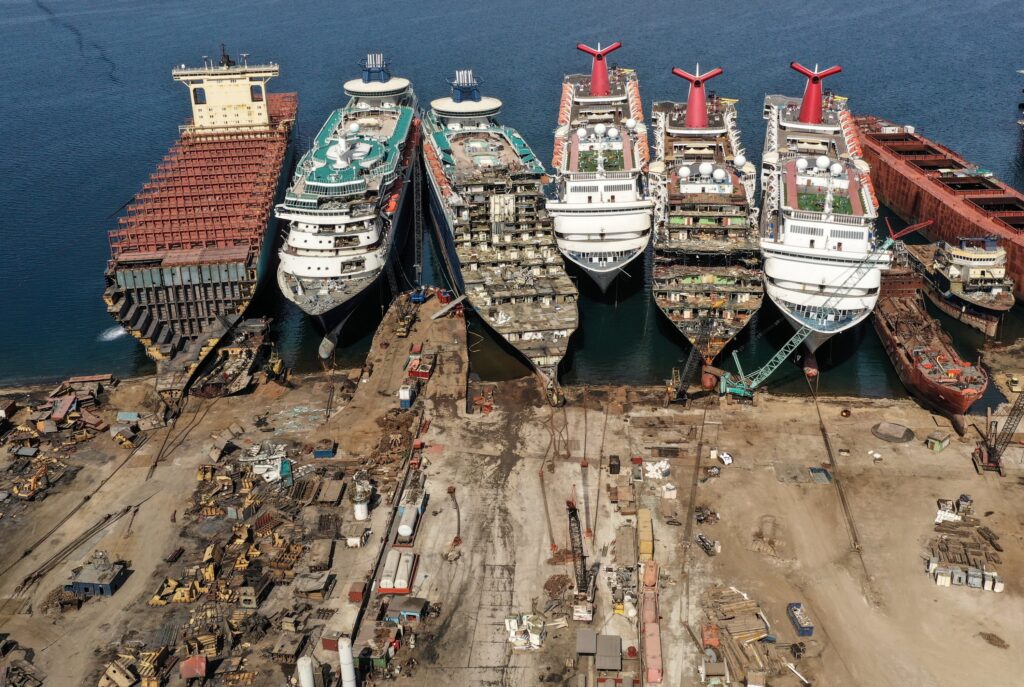Ship Recycling Industry on Hold Amidst Global Turmoil: GMS
According to cash buyer GMS, the global ship recycling industry is facing unprecedented challenges as a perfect storm of geopolitical tensions, economic instability, and currency fluctuations wreaks havoc on the market.
In a stark assessment of the current climate, GMS has called for a temporary pause in the industry to allow for a return to stability. The company points to a series of escalating crises that have combined to create a toxic environment for ship recycling.
The Middle East, a region traditionally linked to the shipping industry, has been thrust into a state of high alert following increasing threats from Iran and Hezbollah against Israel. The deployment of two US aircraft carrier strike groups to the region has further heightened tensions.
Compounding the geopolitical turmoil, Bangladesh has experienced a sudden political upheaval with the abrupt resignation and flight of Prime Minister Sheikh Hassina. The political vacuum in one of the world’s major ship recycling nations has sent shockwaves through the industry.
Meanwhile, the Indian economy is grappling with its own set of challenges. A sharp decline in steel prices, coupled with a weakening rupee, has severely impacted the profitability of ship recycling in India. The country’s largest recycling hub, Alang, has seen a dramatic drop in demand and prices for vessels, with offers for dry bulk carriers plummeting below USD 500/LDT.
The recent budget, which was expected to boost the Indian economy, has failed to dispel the gloom hanging over the ship recycling sector. Furthermore, the recognition of four additional Hong Kong Convention (HKC) compliant yards in Bangladesh could divert even more HKC-compliant vessels away from India.
“It’s safe to say the world is in need of a serious break before a modicum of stability can return, not only for the sake of global peace but also for ship recycling so that our industry has a chance to revive its confidence and offer meaningful levels on fresh tonnage once again,” said a spokesperson for GMS.
The cash buyer emphasized the need for a temporary pause in the industry to allow for the resolution of geopolitical tensions, stabilization of economies, and a recovery in steel prices. Only then can the ship recycling market begin to regain its footing.
The situation in Pakistan, traditionally a top ship recycling destination, is equally dire. Despite firmer levels being quoted, no fresh arrivals have been reported at Pakistani shipbreaking yards. The combination of geopolitical uncertainty, economic instability, and the overall downturn in the global shipping industry has created a perfect storm that has brought the Pakistani market to a standstill.
Industry experts warn that the current crisis could have far-reaching consequences for the ship recycling industry. If left unchecked, the downturn could lead to widespread job losses, closure of shipbreaking yards, and a decline in environmental standards.
As the world watches with bated breath, the ship recycling industry is caught in the crossfire of global turmoil. The urgent need for a resolution to the various crises facing the world is paramount not only for the sake of global peace but also for the survival of a vital industry.
Impact on the Global Shipping Industry
The turmoil in the ship recycling market is having a ripple effect on the global shipping industry. With ship owners facing uncertainty over the value of their older vessels, investment in new buildings has slowed down. This, in turn, is affecting shipbuilding and repair yards, as well as the supply chain of marine equipment and services.
Furthermore, the decline in ship recycling activity has implications for the environment. Older vessels often contain hazardous materials that need to be properly disposed of. A reduction in ship recycling can lead to increased risks of pollution and environmental damage.
Call for International Cooperation
In light of the unprecedented challenges facing the ship recycling industry, GMS has called for international cooperation to address the crisis. The company believes that concerted efforts by governments, industry stakeholders, and international organizations are needed to stabilize the market and ensure the long-term sustainability of the sector.
Key areas of focus should include:
- Geopolitical stability: Addressing regional conflicts and tensions to create a more secure environment for the shipping industry.
- Economic recovery: Implementing policies to stimulate economic growth and stabilize currencies in major ship recycling nations.
- Steel price stabilization: Finding ways to support the steel industry and prevent excessive price fluctuations.
- Environmental protection: Strengthening regulations and enforcement to ensure that ship recycling is carried out in an environmentally responsible manner.
- Industry support: Providing financial assistance and other forms of support to ship recycling businesses during this challenging period.
By working together, the global community can help the ship recycling industry weather the current storm and emerge stronger on the other side.
Conclusion
The ship recycling industry is at a crossroads. The perfect storm of geopolitical tensions, economic instability, and currency fluctuations has brought the market to its knees. While the challenges are immense, there is hope for recovery if the global community can unite to address the underlying issues.
As the world watches with bated breath, the ship recycling industry is caught in the crossfire of global turmoil. The urgent need for a resolution to the various crises facing the world is paramount not only for the sake of global peace but also for the survival of a vital industry.
[Note: This news story is based on the information provided in the prompt and aims to provide a comprehensive overview of the situation. It can be further expanded and enriched with additional data, expert opinions, and analysis.]
Would you like to add any specific details or focus on a particular aspect of the story?








